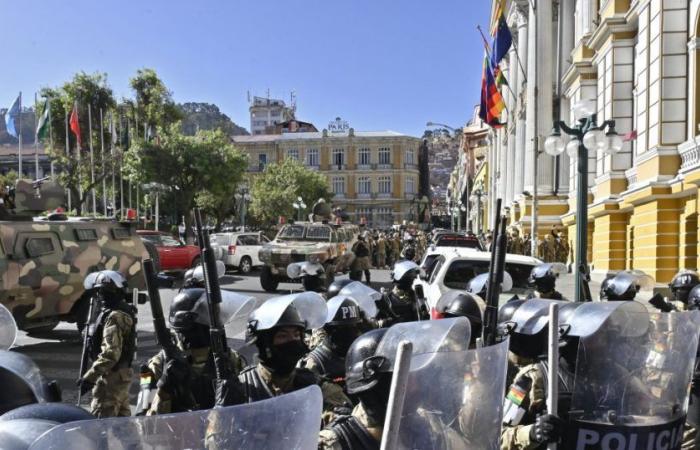The military uprising in Bolivia failed. The police of the South American country arrested the dismissed general tonight Juan José Zúñigawho had led a coup d’état against the government of the Bolivian president on Wednesday Luis Arce.
Before being arrested, Zuñiga had indicated to local media his intentions to change “the government cabinet” to establish a “true democracy” in Bolivia and release “to all political prisoners” including former president Jeanine Añez, opposition governor Luis Fernando Camacho and “all the imprisoned military personnel.” However, his efforts were controlled by the Bolivian government.
Hours before the arrest, President Arce, in a demonstration of strength, spoke from the Casa Grande, the current headquarters of the Bolivian Government, from where he swore in the new military command, announcing Jose Wilson Sánchez Velasquez as Zuñiga’s replacementand also asked for the support of Bolivians to defend democracy.
“Here we are, the entire national government, with all its ministers, standing firm with our vice president, standing firm here in Casa Grande to confront any coup attempt, any attempt that threatens our democracy,” said Arce. “We cannot allow coup attempts to take Bolivian lives, we want to urge everyone to defend democracy. We are standing firm in Casa Grande with social organizations.”
Minutes before Zúñiga’s arrest, the Bolivian Prosecutor’s Office announced in a statement the beginning of a “criminal investigation” against the former commander of the Bolivian Army and all those soldiers who accompanied him.
A controlled rebellion
Through his account on X (formerly Twitter), President Arce alerted Bolivians and the international community about the military uprising in the South American country.
In his short message, published at 2:57 p.m. local time, he noted that there was a “irregular mobilization” of “some units” of the Bolivian Army. “Democracy must be respected,” he asked at that moment of maximum tension.
At that time, the Bolivian media began to report that the uprising was led by General Zúñiga, who had been removed from his position as army commander hours before. This occurred after warning former socialist president Evo Morales about potential arrest if he decided to run for president again.
“Our Homeland, once again, has lowered the stalking of internal and external enemies that seek division, destabilization and hatred among Bolivians, to take over natural resources for the benefit of petty interests and power groups that respond to caudillismo “Zúñiga had said hours before leading the rebellion.
A report from the Spanish newspaper The country of Spain pointed out that the soldiers who accompanied Zúñiga, armed and armed with tanks, occupied the Quemado Palace, the former seat of the Government, after forcing the doors with an armored vehicle. The same could be seen in a viral video published on social networks.
“Arce himself, as seen in images broadcast by Bolivian media on social networks, has stood up to Zúñiga and has ordered the withdrawal of the military,” reported The country.
Shortly after, President Arce called on his followers to defend democracy. “We need the people to mobilize against the coup d’état. We cannot allow the coup attempts to return. We salute the organizations for their mobilization for democracy. Long live Bolivia. Long live democracy,” said the head of state from the Casa Grande del Pueblo, the current seat of government that is located a few meters from the Palacio Quemado. He had not yet been sworn in to the new military command.
Reactions to the “coup”
Shortly after the uprising began, various Bolivian political figures condemned the uprising. Within minutes, the complaint came from the socialist Evo Moraleswho called the uprising a “coup d’état.”
“The Coup d’état is brewing. At this moment, personnel from the Armed Forces and tanks are deployed in Plaza Murillo,” Morales said in X. “We call for a National Mobilization to defend Democracy against the coup d’état that is brewing the general’s head.”
At the same time, Jeanine Añez, opposition leader, political prisoner and also former president of Boliviarepudiated the military mobilization in X and advocated a democratic exit for Arce and his party MAS.
“Total repudiation of the mobilization of the Military in Plaza Murillo attempting to destroy the constitutional order, the MAS with Arce and Evo must leave through the vote in 2025. We Bolivians will defend democracy,” said Añez.
Internationally, the military uprising also generated rejection from the Organization of American States (OAS), which, through its secretary general, Luis Almagro, stressed its zero tolerance for “any form of breach of the constitutional order” in Bolivia.
“We express our solidarity with President Luis Arce Catacora. The international community, the general secretariat of the OAS will not tolerate any form of breach of the legitimate constitutional order in Bolivia or anywhere else,” Almagro said from Asunción, Paraguay, where the until Friday the General Assembly of the organization.
This is a developing story.






